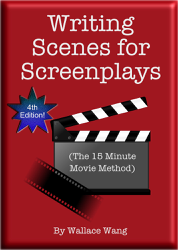When an audience sees a movie, they want to be surprised (in a good way). That means every scene should never be exactly what it seems to be initially. Think of the scene in “Pulp Fiction” where John Travolta and Samuel L. Jackson are talking about fast food in Europe while driving in a car. Right away, the question of fast food differences between America and Europe is interesting in itself. Then the scene ends with another surprise by revealing the two men are hit men armed with guns.
In “Paddington 2,” the opening scene shows two older bears having a picnic on a bridge over a river. Seeing talking bears by itself is interesting, but then they spot a bear cub caught in the river, nearly drowning and about to go over the waterfalls. That’s when the two elderly bears work together to save the bear cub. What starts off as a seemingly peaceful picnic has changed dramatically into a rescue of a bear cub who almost died.
That’s the sharp contrast you’re looking for when writing your own screenplay. Make sure every scene surprises the audience as drastically as possible because the more you can play with their emotions, the more engaging the scene will be.
Watch this scene from “Battle: Los Angeles”, which tells the story of aliens who invade Earth and take over Los Angeles. You expect marines to rush into battle, be a little nervous, but perform their duties – and that’s exactly what happens. In other words, nearly every scene in “Battle: Los Angeles” is predictable and thus boring.
This “Battle: Los Angeles” scene provides few surprises and seems like a straightforward war story. In contrast, study this scene from “Apocalypse Now”, which depicts a similar idea of troops preparing for battle. The difference is that this “Apocalypse Now” scene constantly surprises us.
First, the Americans are planning to attack a Vietnamese village along the coast because the waves are good for surfing. When the helicopters take off, a bugler plays a song like a cavalry group readying for an attack, which is unusual and different. As the helicopters approach the Vietnamese village, they play classical music through loudspeakers to announce their arrival and frighten the Vietnamese. The contrast between a war and classical music makes this scene interesting and different.
There’s also a subtle scene with a soldier sitting on his helmet inside the helicopter to avoid having his testicles shot off from bullets fired from the ground. Once again, this gives us a glimpse at something unexpected. The loud classical music blaring from the helicopters is then contrasted with the quiet of the Vietnamese village that’s about to come under attack, with children being rushed to safety.
Then the battle begins and it’s what we expect with the Americans flying in, shooting up everything in sight and the Vietnamese fighting back, hitting a few helicopters in the process. What’s different is the complete nonchalant attitude of the American commander who calmly drinks from a coffee mug in the middle of a battle.
As the American troops land, one is wounded and a helicopter arrives to evacuate him. That’s when a Vietnamese woman tosses a hand grenade in it, blowing it up and creating another yet another surprise since it seems like the helicopter would succeed in evacuating the wounded soldier.
When the Americans finally take over the village, the commander stands around unconcerned as mortar fire lands around him. He orders two soldiers to go surfing despite the danger from enemy fire. The visual image of men surfing while mortar blasts splash around them in the water is still another unusual sight.
Finally, the Americans suppress the enemy mortar fire by laying down napalm, and that’s when the American commander says he loves the smell of napalm in the morning because it smells like victory.
Look at how many interesting and unusual surprises the “Apocalypse Now” battle scene gives us. In comparison, the “Battle: Los Angeles” battle scene gives us nothing different and nothing surprising. Despite all the special effects, explosions, and gunfire in “Battle: Los Angeles,” the battle scene is completely boring. That’s exactly what you don’t want in your own screenplay because no amount of special effects can make up for a scene that does nothing but give the expected.
Always give us the unexpected because surprise is what makes scenes interesting. Study your favorite movies and notice that nothing goes exactly as planned because if it did, it would be boring.
Never be boring. If you can do that, you’ll increase your chances of writing an interesting screenplay.
Sign up to take a FREE course about how to write scenes in a screenplay.

